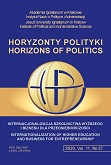Tocqueville i problemy z naturą demokracji
Tocqueville and Problems with the Nature of Democracy
Author(s): Tomasz SłupikSubject(s): Political Philosophy, Government/Political systems
Published by: Uniwersytet Ignatianum w Krakowie
Keywords: democracy; A. de Tocqueville; P. Manent; equality; mass man; mild despotism;
Summary/Abstract: RESEARCH OBJECTIVE: The scientific goal is to show the specific features of democracy and their impact on the condition of the contemporary individual and society from the perspective of the history of ideas, basing on the analysis of the texts of A. de Tocqueville is and his outstanding interpreters, such as P. Manent, M. Oakeshott. THE RESEARCH PROBLEM AND METHODS: Showing the essence of the concept of democracy from the historical idea perspective in its theoretical and practical view. A. de Tocqueville’s excellent analysis of democracy in his book “Democracy in America” since its premiere in France in 1835 (volume 1) and 1840 (volume 2) has not absolutely lost its meaning and topicality. On the contrary. The rediscovery of Tocqueville in the 1950s was due to R. Aron. P. Manent his most outstanding student continued his work on interpreting Tocqueville’s thoughts. The merits of these two outstanding intellectuals for popularizing the thoughts of A. de Tocqueville are indisputable. It is thanks to them the author of “Democracy in America“ first found its way into European and later global intellectual circulation. Thus, analysis of democracy based on the tools developed by Tocqueville and his interpreters is extremely useful for studying the condition of contemporary democracy. THE PROCESS OF ARGUMENTATION: The text begins with an analysis of the revolutionary changes in Western societies, mainly: France and the USA and their impact on political, social and economic conditions. Later, the author focuses on discussing the effects of democratic transformation. Most of all it is about the principle of people’s sovereignty, a new rule of legitimacy of power, which replaced the earlier principle of the king’s sovereignty. This rule raises a lot of controversy, it is imprecise, and today it has become an empty gesture, not a significant ritual. Next, a peculiar paradox of democracy is presented, which is naturally a social phenomenon intending to deepening social ties, brings the opposite effect, their loosening and even disintegration. In turn, in a democracy (or rather its contemporary version of liberal democracy), the fragile balance between equality and freedom results in its numerous deformations. Therefore the short conclusion is: freedom loses competition with equality. Then the author shows the effects of equality triumph. The consequence of this phenomenon is the appearance of a “mass man” with all his defects. And fin ally, the concept of “mild despotism” is presented as an illustration of the process of ““incapacitation” of modern societies and individuals by the ubiquitous modern state, expanded in many spheres. RESEARCH RESULTS: The main result of scientific analysis is to show the impact of the democratic revolution that has taken place for over the last two hundred years on: the individual, society, form the point of A. de Tocqueville’s work view, as well as its contemporary interpreters. The above analysis concerns the functioning of man in the area of politics, economy and culture. The conclusion of the observations contained in this article is pessimistic. Democracy has a number of disadvantages which, when socio economic circumstances occur, can lead to deformation and even the collapse of society. CONCLUSIONS, INNOVATIONS, AND RECOMMENDATIONS: In his conclusions, the author focuses on the consequences of equality in democracy. Both that P. Manent describes as “natural” and the second one that he describes as “imagined” as well. In democracy and mainly in liberal democracy, the tension between freedom and equality leads to its loosening and consequently to even deep crisis. In this system model, at the level of ideas as well as political practice, this contradiction cannot be alleviated or eliminated. This creative tension, especially for several decades after World War II, brought peace, prosperity, and social and political stability in the West. The second decade of the 21century undermines this state of affairs. Liberal democracy being under the pressure of negative phenomenon, such as social stratification, undergoes a serious crisis, the effect of which two new system models may occur: “illiberal democracy” or “undemocratic liberalism”.
Journal: Horyzonty Polityki
- Issue Year: 11/2020
- Issue No: 34
- Page Range: 67-86
- Page Count: 20
- Language: Polish

